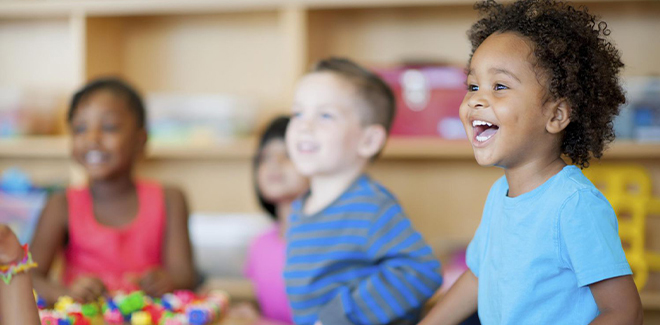Children’s social development is a complex and vital aspect of their overall development. This includes acquiring social skills, the ability to build and maintain relationships, and understanding social norms and expectations. This development begins at birth and continues throughout a child’s life, playing a vital role in shaping their future interactions and relationships.
In the early years, infants begin to develop social skills by engaging in basic interactions with their caregivers. These interactions are fundamental to attachment and building trust, as babies learn to recognize and respond to facial expressions, emotions, and vocal tones. As children grow, they begin to interact with their peers, allowing them to develop basic skills such as sharing, cooperation, and conflict resolution. These early social experiences lay the foundation for more complex social interactions in the future.
Preschool and elementary school are very important for children’s social development. They expand their social circles and learn to navigate different social contexts. They develop empathy and understanding of other people’s points of view. Friendships become increasingly important as they learn to trust, communicate, and cooperate with their peers. Through play and social activities, children develop important social skills that contribute to their emotional and psychological well-being.
Adolescence is a period of significant social growth marked by a search for identity and a growing need for independence. As teenagers discover their beliefs and identity, they begin to develop a more complex understanding of social norms and values. Peer influence becomes prominent, and adolescents struggle with the challenges of peer pressure, identity formation, and more complex romantic relationships. This is a period of self-knowledge and increasing social awareness.
What does social development mean?
Social development refers to the process through which people acquire the necessary knowledge, skills, attitudes and behaviors to effectively interact with others and participate in their social environment. It includes a wide range of abilities and characteristics related to how people relate and interact with the world around them, especially in social settings. Social development is a lifelong process that begins in early childhood and continues throughout a person’s life, with key developmental milestones occurring at different stages.
The key aspects of social development are:
Communication skills: This includes cognitive development and the ability to express oneself clearly, listen carefully and understand non-verbal cues. Effective communication is critical to building relationships and resolving conflicts.
Emotional intelligence: the capacity to recognize, understand, manage and properly express emotions is one of the basic components of social development. In addition, it involves empathy for the feelings of others.
Relationship building: Social development includes building and maintaining relationships with family, friends, peers, and other members of the community. This includes developing the ability to make friends, cooperate and engage in healthy interpersonal interactions.
Conflict resolution: Learning how to manage and resolve conflict peacefully and constructively is a vital part of social development. This skill enables people to handle differences without damaging relationships.
Social Awareness: Awareness of social norms, cultural values and understanding of the wider social context is a vital aspect of social development. This includes recognizing and respecting diversity in terms of culture, race and gender.
Self-identity: Social development plays a role in the formation of a person’s identity and self-concept. It includes understanding one’s role in different social groups, values, beliefs and personal identity.
Social responsibility: As people grow socially, they become aware of their responsibility towards society and their society. This includes participating in community service, contributing positively to society, and upholding social norms and values.
Social development is not limited to any particular age group but evolves over time. It is influenced by various factors including family, culture, education and social experiences. A strong foundation in social development is essential to building healthy relationships, contributing to a thriving community, and enhancing personal well-being.

Strengthening the social development of children
Fostering children’s social development is a critical task for parents, caregivers, and educators. Here are some effective strategies to support and enhance children’s social development:
Positive role modeling: Children often learn by observing the behavior of adults. Modeling positivity by showing empathy, kindness, respect and good communication skills can significantly influence a child’s social development. Showing how to peacefully resolve conflicts and how to build healthy relationships provides valuable lessons.
Encourage play and interaction: Encourage children to participate in different types of play, including cooperative games and group activities. These experiences allow them to practice social skills such as sharing, cooperation and communication while having fun.
Teaching empathy and emotional intelligence: Help children understand and manage their emotions and empathize with others. Discuss feelings, encourage them to express others’ feelings, and teach them to recognize and respond to others’ feelings. This not only strengthens their social skills, but also enhances their ability to make meaningful connections.
Effective Communication: Encourage open and honest communication with children. Actively listen to their concerns and validate their feelings. Teach them how to express themselves clearly and respectfully, both in words and in body language.
Problem Solving and Conflict Resolution: Teach children problem solving skills and conflict resolution techniques. It involves negotiation, compromise, and finding win-win solutions. By empowering them to resolve conflicts on their own, you promote their social independence.
Foster positive peer relationships: Encourage children to make friends and develop positive peer relationships. Facilitate play dates and social opportunities and monitor these interactions to ensure they are positive and respectful. Support them if they encounter problems and offer guidance on how to handle social challenges.
Teach respect for diversity: Emphasize the importance of respecting and appreciating diversity in all its forms, including cultural, racial, and gender diversity. This helps children develop a more inclusive and accepting perspective and promotes healthy social interactions.
Community Involvement: Involvement of children in community service or volunteer activities can foster a sense of social responsibility and empathy. This helps them understand the importance of giving back and making a positive impact on society.
Setting clear boundaries: Clearly define expectations and boundaries for behavior and social interactions. Consistent discipline and guidance make children feel safe and help them understand the consequences of their actions on others.
Seek professional help if necessary: If a child has persistent social problems or struggles with more severe social issues such as social isolation, seek help from a child psychologist or counselor. Professional intervention can provide targeted strategies and support.
Strengthening the social development of children is a continuous process that is one of the big steps of parenting that requires patience, stability and a nurturing environment. By implementing these strategies and creating a supportive, respectful, and loving environment, caregivers and educators can help children build the strong social foundations they need for a successful and fulfilling life.

Stages of social development of children from infancy to adolescence
Children’s social development progresses through different stages from infancy to adolescence, each of which is characterized by specific milestones and changes. Here is an overview of these steps:
Infancy (0-2 years):
- Attachment: Babies form a strong emotional bond with their primary caregivers, typically their parents. This attachment is very important for feeling safe and trusting.
- Social Smiling: Around 2 months of age, babies begin to smile socially and respond to facial expressions and interactions with others.
- Basic social interaction: Babies begin to engage in simple back-and-forth interactions with caregivers, such as cooing and cooing in response to sounds.
Childhood (2 to 6 years):
- Parallel play: children engage in parallel play and play alongside other children without direct interaction. They begin to observe and imitate their peers.
- Formation of friendship: The concept of friendship is formed and children begin to find their first friends. The date of the game becomes popular.
- Sharing and Cooperation: Children learn basic social skills such as sharing toys, cooperating in games, and following simple rules.
middle age (6 to 12 years):
- Peer Relationships: Friendships become more important and children develop strong peer relationships. They develop the ability to resolve conflicts and maintain friendships.
- Empathy: Empathy and understanding of other people’s emotions is refined and makes for better perspective-taking and supportive interactions.
- Moral development: Children develop a sense of right and wrong under the influence of their social environment and social values.
Adolescence (12-18 years):
- Identity Formation: Adolescents discover their identity, including personal values, beliefs, and interests. This process affects their social interactions and peer group selection.
- Peer influence: Peer relationships become very influential and often take precedence over parental influence. Adolescents seek peer approval and may experience peer pressure.
- Romantic relationships and dating: Teenagers begin to explore romantic relationships, which creates new complexities in their social development.
Late adolescence (18 years and older):
- Transition to adulthood: Late adolescence marks the transition to adulthood, including increased independence, higher education, and career development.
- Building intimate relationships: Young adults are building more serious and intimate relationships, potentially leading to long-term commitments and families of their own.
- Continuing Identity Development: Identity formation continues, including career choices, values, and life goals.
During these stages, Social development of children is influenced by various factors, including family, peer relationships, cultural and social norms, and individual experiences. It is important to note that these steps are approximate and can vary from person to person. In addition, the speed and quality of social development can be affected by external factors such as socio-economic status and the presence of supportive or challenging environments.












